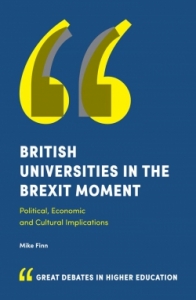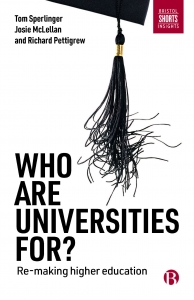The history of universities, including in the UK, is always also the history of the political community; their future, equally, dependent on the future of the community as a whole. In this review essay, Jana Bacevic examines two recent books that offer a good illustration of this point, Who Are Universities For? by Tom Sperlinger, Josie McLellan and Richard Pettigrew and British Universities in the Brexit Moment by Mike Finn.
What we talk about when we talk about universities

 It is perhaps cliché to say that no conversation concerns only its subject. Rarely, however, does this ring as true as when it comes to universities, institutions that are simultaneously objects of inspiration and intimidation, pride and critique, admiration and administration (in the sense of being managed or governed). Conversations about universities inevitably lead to questions such as what kind of society we want to live in, who should be leading that society and, not least, who this ‘society’ should include or exclude. The history of universities, including in the UK, is always also the history of the political community; their future, equally, dependent on the future of the community as a whole.
It is perhaps cliché to say that no conversation concerns only its subject. Rarely, however, does this ring as true as when it comes to universities, institutions that are simultaneously objects of inspiration and intimidation, pride and critique, admiration and administration (in the sense of being managed or governed). Conversations about universities inevitably lead to questions such as what kind of society we want to live in, who should be leading that society and, not least, who this ‘society’ should include or exclude. The history of universities, including in the UK, is always also the history of the political community; their future, equally, dependent on the future of the community as a whole.
Two recent books offer a good illustration. In Who are Universities For?, Tom Sperlinger, Josie McLellan and Richard Pettigrew address the relationship between exclusion, social marginalisation and the accessibility of institutions of higher education, long recognised as a site for the reproduction of social inequalities. In British Universities in the Brexit Moment, Mike Finn discusses the history of the internationalisation of British higher education and the possible implications of the other B-word in its title. Despite taking somewhat different angles on the ‘predicament’ of UK universities, the books share an awareness of the specificity of historical processes that created it, as well as the relevance and salience of the present moment for its future.
In British Universities in the Brexit Moment, Finn offers a reconstruction of negotiation processes that enabled the inclusion of higher education within the domain of EU policymaking. This, alone, was a major achievement; nation states (including EU members) are traditionally protective of education, often seen as an instrument for the ‘inculcation’ of ‘national values’, as well as training vital professions – doctors, teachers and lawyers. What initially enabled the exemption of higher education from this rule was its inclusion in the Global Agreement on Trade in Services (GATS), and the growth of higher education as an ‘export industry’ – not only in the UK, but also in Australia, New Zealand, Canada, China and, of course, the US. The creation of the European Higher Education Area (EHEA) and its flagship mobility programmes such as Erasmus was similarly driven by the not-exactly-concealed agenda to make Europe more attractive as a destination for international students.
The UK’s relationship with EHEA (in an unsurprising parallel with other elements of EU policy) was always ambiguous. It was a leader in commodification and internationalisation, thanks in part to the early adoption of tuition fees and in part to its history of colonial conquest and the spread of English as lingua franca. When it came to other elements of the ‘common market’ – including extending the system of grants and loans to students from other EU member states – it was decidedly less ambitious, agreeing to it only after a sustained push from student unions. Fee regimes remain one of the most pronounced differences between higher education systems of constituent nations, with Scotland, for instance, extending the ‘Home’ fee regime to students from the EU, but not those from England or Wales.
This is just one of the many areas where Brexit may have interesting consequences. The second part of British Universities in the Brexit Moment turns from Brexit’s political genesis to the discussion of these consequences for, respectively, students and staff, and research and funding. The third part takes again the ‘long view’, addressing the implications of Brexit for British social and political context, including ‘post-truth’ and the ‘crisis of expertise’. The conclusion, ‘The Political Economy of British Universities’, returns to the historical role of universities in British society, including in relation to social stratification. Despite the title of this section, however, one is left with the impression that a more serious engagement with political economy would be welcome. There is relatively little discussion of the relationship – and possible tension – between access and forms of funding, for both students and institutions, as well as their implications for broader social and class mobilisation or, indeed, its political consequences.
Who higher education should be for, and how we get there, is the main topic of Sperlinger, McLellan and Pettigrew’s Who Are Universities For?. The book grew out of the authors’ engagement in the Foundation Year in Arts and Humanities at the University of Bristol, a widening participation initiative that aims to make higher education – and especially degrees in arts and humanities – accessible for those who, by the virtue of social background, personal circumstances, or their combination, have previously concluded it was not for them. Despite many attempts to widen participation, higher education is still seen as a site for the reproduction of elites, in part because of the distinction between the social status of those who tend to go to Oxford, Cambridge and other Russell Group universities, and others, including students at former polytechnics and further education colleges. In this sense, opening one of England’s top universities for some of the people who would traditionally be excluded from it – and, at that, in distinctly ‘non-technical’ fields – certainly provides important lessons on how inclusive higher education could work in a politically different future.
Who are Universities For? is far from a guide for widening participation practitioners, however. The book bears the imprint of the authors’ disciplinary groundings – English Literature, History and Philosophy, respectively – and uses the voices of Foundation Year participants as an entry point for discussions about problems of inclusion, equality and social justice. Drawing on a range of experiences, from the Bard Prison Initiative (whose graduates went on to beat Harvard University’s debating team) and the history of women’s and Black liberation, to authors’ personal histories, it shows that learning can and does happen at all stages of life. This leads the authors to ask: how could we design education systems in order to foster and support, rather than impede, this endeavour?
Sperlinger, McLellan and Pettigrew sketch out a vision for a more flexible, universal higher education. The proposal involves a ‘modularization’ of degrees – essentially, decoupling from discrete stages demarcated by measurement of performance at entrance (admissions) and exit (exams) – with part-time learning becoming the norm. Free for students, the system would be funded by a Participatory Education Tax (PET). The book includes a longer footnote showing how participatory budgeting would work in practice, on the basis of economic projections for the current UK population. Yet, the one thing it leaves somewhat underexplored is, precisely, who would be able to access it. Would it be open to UK nationals/permanent residents only, or would this possibility be open to students from other backgrounds? It makes sense to assert that education benefits from a diverse body of participants, but whether this would reintroduce the old distinction between ‘Home’ and ‘Overseas’ students and exacerbate existing differences in fee regimes and other elements of the ‘hostile environment’ remains an open question. Of course, it is hardly fair to expect any book to answer one of the most profound questions of most contemporary plural societies: that of the compatibility or tension between equality and difference. Yet, it remains a potent reminder of why talking about universities is never about universities only.
Do we need not one but two more books on universities? Previously, I have written about the paradoxical growth of the genre of critique of neoliberalism in UK higher education, pointing out that the ‘proliferation’ of critique was yet to be met with an equivalent rise in resistance. After the USS strikes in 2018 and the recently completed round of industrial action around pay, pensions and equality, it is possible to hope that the sector is at the start of a longer process of political awakening and mobilisation. On the other hand, the results of the 2019 British General Election suggest this may be a long and protracted fight, one that will possibly require unprecedented levels of commitment and solidarity among academics and institutions, as well as between universities and other political and social movements.
In this context, books like Who are Universities For? are a highly necessary blend of critical humanist analysis and concrete policy proposals, not shying away from discussing their broader social and political implications. Though British Universities in the Brexit Moment offers fewer solutions, it draws attention to the fact that the future of a political community is never defined solely within its physical (or administrative) borders. In combination, they serve as a reminder that who universities are for is, in the end, only a subset of the broader question: who the society is – and should be – for. This seems like a pertinent, if difficult, lesson for any kind of political movement in the future.
Note: This review gives the views of the author, and not the position of the LSE Review of Books blog, or of the London School of Economics.
Image Credit: UCL Occupation. CC BY SA 2.0.








